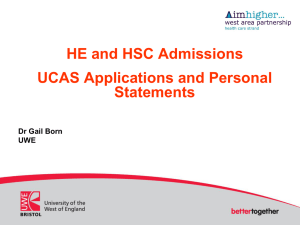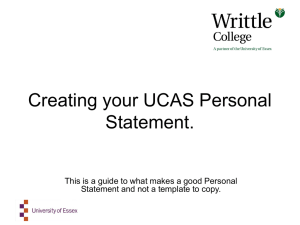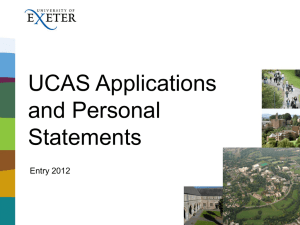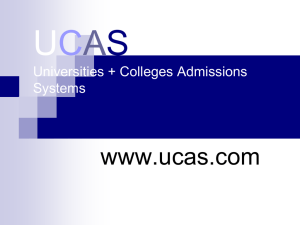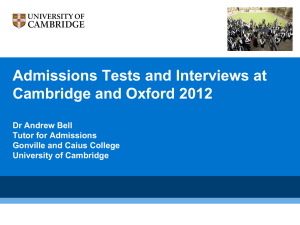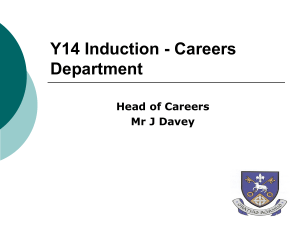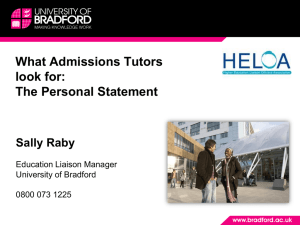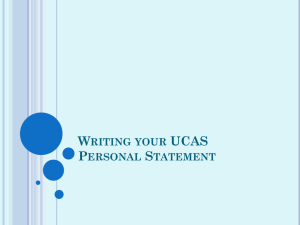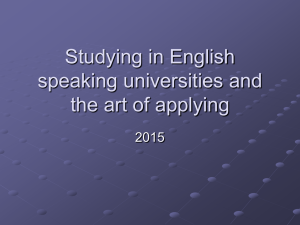UCAS Support for Parents
advertisement
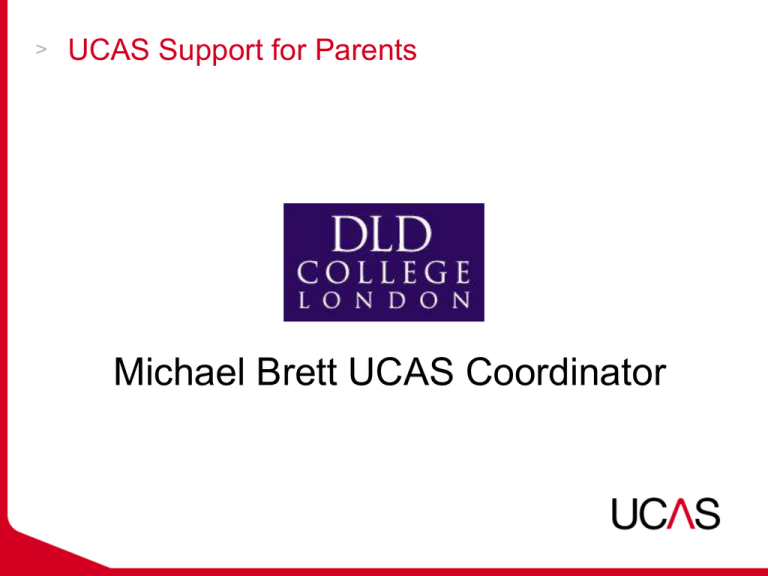
UCAS Support for Parents Michael Brett UCAS Coordinator What is UCAS? Who we are We are the organisation responsible for managing applications to higher education courses in the UK. Our services date back to 1961. To meet increasing demand, UCCA (Universities Central Council on Admissions) was formed, providing a centralised application service for prospective undergraduates – effectively streamlining the process. UCCA formally merged with its partner organisations PCAS (Polytechnics Central Admissions System) and SCUE (Standing Conference on University Entrance) in 1993 to create one independent service. What we do UCAS stands for the 'Universities and Colleges Admission Service'. Our aim is to help students make informed choices that are right for them, guiding them, as well as their parents and advisers, through the entire higher education application process. Today, UCAS processes over 2.5 million applications every year, for some 650,000 prospective students across the UK and beyond: helping them gain access to more than 340 UK universities and colleges. We also run several specialist application services – GTTR (Graduate Teacher Training Registry), UKPASS (UK Postgraduate Application and Statistical Service) and CUKAS (Conservatoires UK Admissions Service). Another important area is carrying out research, consultancy and advisory work for schools, colleges, careers services, professional bodies and commercial businesses. Data collation is an important part of our work, allowing us to provide advice, insights and statistics to our partners and stakeholders. Helping DLD students through the UCAS Application Presentation Outline: What students are told Why go on to higher education? The applicant journey Research Personal statements HOW CAN DLD PARENTS HELP? Why go on to higher education? Increase your earning potential Better career prospects It is beneficial for the wider community Social and cultural reasons (25%, 44%) It can be immense fun Independence, self confidence and responsibility Broaden or deepen interests and knowledge Better health Help you develop your future Transferable skills Personal challenge Stop gap Choosing courses Applying Offers Results Next steps Starting Uni / College 1 2 3 4 5 6 Online research UCAS.com Institutions Subject specific Unistats National press? Journals Social media websites Government sites e.g. GOV.uk, Student Finance England How do I know if I have got what they are looking for? Make full use of open days Open day Tips: •Book •Take PS •Go on campus tour •Know what Quals you are taking •Ask Questions! Work experience Don’t forget about Professional bodies/Charities Attend/organising events Coordinator Admin support Secretary Treasurer Researcher Web editors Design and publications Key features of the UCAS scheme Only 1 x application each year/cycle Maximum of 5 choices for most applicants: Medicine, Veterinary Science, Dentistry – max 4 Oxford or Cambridge Online application and management at ucas.com Apply and Track 2014 fee - £23/12 Once the form is in you can’t make any changes Simultaneous consideration & ‘Invisibility’ There are opportunities for other choices: Extra and Clearing Key dates and deadlines Late June: applicants can register and start to complete their application Mid September: School can start to submit completed applications to UCAS 15 October: deadline for Medicine, Veterinary Science , Dentistry Admissions test Oxford or Cambridge may need to be completed prior 15 January: main deadline to applying 24 March: deadline for some Art & Design Making the application Every applicant has five sections to complete, 1 is optional: Personal details Additional information (UK students only)* Student finance Choices Education Employment Personal statement Forward to Personal Tutor to check ( D.O.S. Principal) DLD Reference ALLOW TWO WEEKS UCAS Universities / colleges DLD 2013 - This year’s lessons: Ensure you have documentation of ALL previously attained qualifications (e.g. GCSE) Due to tightening immigration policies universities are increasingly obliged to request proof of English proficiency qualifications during the year, once applications are received Random checks This is the same for UK students! Student’s responsibility – not school’s (all communication is directly with student once application is sent – school has limited power to intervene) Top Tips for the Personal Statement Should be relevant to all your choices Be consistent in your course choices – this makes it easier to write and much more convincing to an admissions tutor 200 personal statements per tutor per week!!!!! Make yours stand out (for the right reasons) however remember the SIMILARITY DETECTION TEST Don’t just list what you have achieved, expand and give specific examples and detail Write it soon, but not before you have CHOSEN the course: You will need to write a few drafts Get input on your draft from ONE person at a time ‘Personal’ means ACADEMIC • 4000 characters including spaces, punctuation and line breaks. • or 47 lines (longer words fill up the lines sooner) • The personal statement MUST relate to your chosen course(s) of study at all 5 universities to which you apply, to your current A levels, and realistically to your achieved (GCSE and AS) and predicted (A level) examination grades. The Personal Statement • Paragraph 1: • Why I am best suited to study YOUR degree course – academic and more general interests, insight, ambitions to learn and understand more. Awareness of world situations relating to the field of study of the degree and how these affect my thinking. • Be specific. The Personal Statement • Paragraph 2: • How my current AS / A2 level studies are enabling me to deepen my knowledge of my chosen interests and how I am able to pursue these interests beyond the scope of the school syllabus. • Be specific. The Personal Statement • Paragraph 3: • Work experience, extra-curricular activities and interests which enhance and develop my skills, knowledge, personal responsibility and independence, all of which make me a promising university degree student. • Be specific. The Personal Statement • Paragraph 4: • Ideas of how my university degree will fit into a longerterm life-plan, including post-graduate study, employment, career, and other aspirations which link directly to the degree course for which I am applying. • Be specific, but this time also open-minded – the world (and you) can change very much in three years! • General Advice – You have 47 lines or 4000 characters – Do not indent paragraphs or use ‘bold’ or ‘underline’ – Leave a blank line between paragraphs – Prepare the Personal Statement in a file then copy and paste it into the online form – Your personal statement should only be concerned with the subject you wish to study and should not refer to specific universities or course details – Ensure you keep a copy of the final statement so that you can look at it if and when you are called for interview – Remember that in an interview you could be asked about any aspect of your Personal Statement The School Reference School profile and student’s academic history with some character description Student’s academic profile and achievement in each subject – explanation of grades/scores Any additional school contribution (extra-curricular) Closing endorsement All references will be commensurate with achieved scores/grades All grade predictions based on ‘common sense’ / optimistic probability – school must protect reputation for accuracy The process post-application When applicants have received decisions from ALL of their choices, if they have offers they will be asked to make replies (and given a date to reply by on Track) If an applicant does not receive any offers they can make an additional choice through the Extra scheme UCAS will send reminders – but if applicants fail to reply to offers by their deadline date, offers will be automatically declined! Applicants can now hold a maximum of 2 offers (others declined) Firm (if you meet the conditions you will be placed) Insurance (only comes into play if you are not placed with your Firm choice) Re-cap: Universities selection tools Personal statement References Qualifications Admissions tests Interviews Additional work Portfolios Auditions Results: Confirmation options 1. Not met conditions of firm 1. Exam results are issued 2. Admissions staff check if the applicant has matched the conditions of the offer 3. If met the conditions of the firm choice, applicant will be placed there. 4. Applicant will be able to view this on track, and will be sent an official confirmation of their place Time to celebrate! choice, but met the conditions of the insurance choice (which should be lower) 2. Applicant is placed at insurance choice Time to celebrate! 1. Not met the conditions of the firm or insurance choice (or no insurance) 2. Applicant is eligible for Clearing 3. Applicant will be able to view decisions on track, and will have a clearing number generated Time to get working! How can parents help? How can you support the application process? Use the Parents section of the UCAS website where you can sign up to the quarterly Parents’ Newsletter Offer to attend open days – you may have a different perspective Support your son/daughter’s management of their application Make sure they read everything they are sent carefully! Financial assistance – railway tickets Try to remain impartial How can you support the application process? Don’t book holidays at key times: e.g. results day Prepare them for living away from home: Cost of living – paying bills Independent living skills – cooking & washing Be there: Comforting, proof reading, encouraging, testing, practising etc. www.ucas.tv Choosing Applying courses in Welsh Personal Writing statements references Attending Understanding events the application Using Process Track (parents) Disclosing Using Yougo your disability Preparing for results International students Next steps Using Extra Applying Making sense of your offers Starting university Replying to offers or college Using Clearing Using Adjustment Official UCAS Support Russell Group, Oxbridge & Medicine What is the Russell Group? The Russell Group represents 24 leading UK universities which are committed to maintaining the very best research, an outstanding teaching and learning experience and unrivalled links with business and the public sector. The Russell Group University of Birmingham University of Bristol University of Cambridge University of Manchester Newcastle University University of Nottingham Cardiff University Durham University University of Edinburgh University of Exeter University of Glasgow University of Oxford Queen Mary, University of London Queen's University Belfast University of Sheffield Imperial College London King's College London University of Leeds University of Liverpool University of Southampton University College London University of Warwick University of York London School of Economics & Political Science Medical Schools Aberdeen (University of), School of Medicine Leicester (University of), Leicester Medical School Barts and The London School of Medicine and Dentistry, Queen Mary, University of London Liverpool (University of), Faculty of Health and Life Sciences Birmingham (University of), School of Medicine London School of Hygiene and Tropical Medicine (Postgraduate Medical School) Brighton and Sussex Medical School Manchester (University of), Faculty of Medical and Human Sciences Bristol (University of), Faculty of Medicine Newcastle University Medical School Cambridge (University of), School of Clinical Medicine Norwich Medical School, University of East Anglia Cardiff University, School of Medicine Nottingham (The University of), Faculty of Medicine and Health Sciences Dundee (University of), Faculty of Medicine, Dentistry and Nursing Oxford (University of), Medical Sciences Division Edinburgh (The University of), College of Medicine and Veterinary Medicine Plymouth University Peninsula Schools of Medicine and Dentistry Queen's University Belfast, Faculty of Medicine and Health Sciences Exeter (University of), Medical School Sheffield (The University of), School of Medicine Glasgow (University of), Faculty of Medicine Southampton (University of), School of Medicine Hull York Medical School St Andrews (University of), Faculty of Medical Sciences Imperial College School of Medicine, London St George's, University of London Keele University, School of Medicine Swansea University, School of Medicine King's College London School of Medicine (at Guy's, King's College and St Thomas' Hospital) University College London, University College Medical School Leeds (University of), School of Medicine Warwick (The University of), Warwick Medical School Oxford and Cambridge (also ‘top’ R.G. and Medicine) Essential that students go to Oxford or Cambridge because they want to study the subject of their choice there and not just because they are desperate be an Oxbridge student Subject choice must come first and interviewers will very quickly see through lack of commitment if this is not the case However alluring the image of Oxbridge might be, courses elsewhere may be better suited to the needs, interests, ability, aptitude and character of the individual applicant Passion for the subject is paramount as well as the necessary skills and knowledge Applicants should research very thoroughly courses involving the study of subjects not taught at school to make sure they know what they are taking on in terms of grade requirements and additional entrance tests Prior academic qualifications (i.e. GCSE, AS scores) are essential considerations and must be uniformly excellent Contact us: Michael Brett - UCAS Coordinator Oxbridge & Russell Group Applications michael.brett@dld.org Christine Reynolds - Head of Science Medicine & Related Applications christine.reynolds@dld.org
